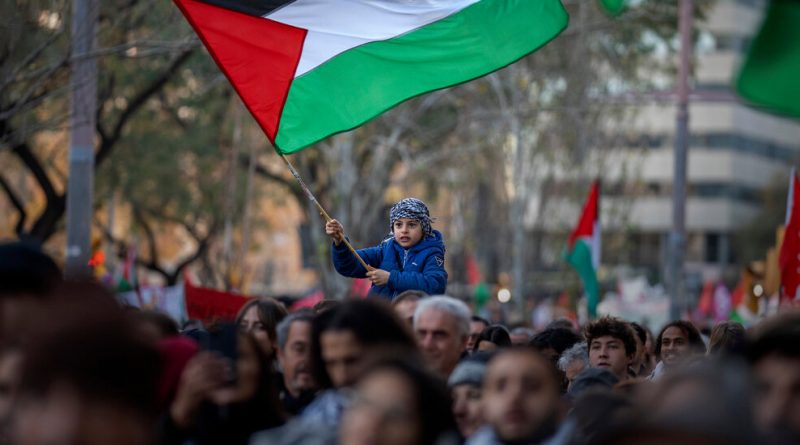Middle East Crisis: Spain, Norway and Ireland Recognize a Palestinian State, a Blow to Israel

Spain, Norway and Ireland said on Wednesday that they would recognize an independent Palestinian state, a rebuke to Israel that, though largely symbolic, reflected dwindling international patience with its military offensive in Gaza and its decades of occupation of Palestinian territories.
Scores of countries have recognized Palestinian statehood, but the closely coordinated announcements by the three nations carried added weight amid the growing toll of the war in Gaza, and because most Western European countries have resisted taking such a step out of solidarity with Israel.
The moves will likely have little immediate effect on conditions for Palestinians in the Israeli-occupied West Bank or in Gaza, where health authorities say that more than 35,000 people have been killed in over seven months of Israeli bombardment and ground combat. But the announcements made clear the view in a growing number of capitals that Palestinian sovereignty cannot wait for a permanent peace deal with Israel, whose right-wing government largely opposes a Palestinian state.
“Palestinians have a fundamental, independent right to an independent state,” Jonas Gahr Store, the prime minister of Norway, said at a news conference in Oslo announcing the decision, which will go into effect on Tuesday.
Spain’s decision will take effect the same day, Prime Minister Pedro Sánchez said, adding that Spain had been forced to act because Prime Minister Benjamin Netanyahu of Israel did not have a plan for long-term peace with the Palestinians.
“The two-state solution is in danger,” Mr. Sanchez said in remarks to Parliament, referring to a proposed framework for establishing an independent Palestinian state alongside Israel. “It’s time to move from words to action — to tell millions of innocent Palestinians who are suffering that we are with them, that there is hope,” he added.
Prime Minister Simon Harris of Ireland said at a news conference that he was confident that other countries would soon join them in recognizing Palestinian statehood.
Maya Sion-Tzidkiyahu, an expert on Israeli-European relations, said the announcements highlighted the erosion of the global support Israel saw immediately after the Hamas-led Oct. 7 attacks that touched off the war in Gaza.
“It proves again to us, as Israelis, the extent to which we are ever more isolated,” said Ms. Sion-Tzidkiyahu, an analyst at Mitvim, an Israeli foreign policy research group.
More than 140 countries and the Holy See have recognized a Palestinian state, but most Western European countries and the United States have not. The longstanding U.S. position is that recognition should be achieved through negotiations between Israelis and Palestinians, and that while it supports a two-state solution, unilateral measures by third parties will not advance that goal.
Israel strongly opposes international recognition of a Palestinian state — Mr. Netanyahu has called the establishment of such a state an “existential danger” — and maintains that Israel needs to negotiate directly with Palestinian leaders on a permanent solution.
But serious negotiations on a two-state solution haven’t been held for over a decade. And some observers argue that by not recognizing a Palestinian state, the West has enabled a far-right Israeli agenda opposed to its existence. It “gives leverage to Israel to keep encroaching on the land and resources and the people of the other state,” Husam Zomlot, the Palestinian envoy to Britain, said in a recent interview.
Palestinian leaders based in the West Bank welcomed the announcements. “We believe it will help preserve the two-state solution and give Palestinians hope that they will have their own state side by side with Israel in peace and security,” Ziad Abu Amr, a senior Palestinian official, said in an interview.
Wednesday’s announcements were the latest blow to Israel on the international stage, and came days after the International Criminal Court’s chief prosecutor requested arrest warrants for Mr. Netanyahu and Israel’s defense minister, along with leaders of Hamas, on war crimes charges stemming from the Oct. 7 attacks and the Israeli offensive in Gaza.
Spain, Ireland and Norway have all strongly criticized Israel’s conduct of the war and have historically been strong supporters of the Palestinians. Irelands support for Palestinians has deep roots; in Spain, Mr. Sanchez has been a leading voice in Europe for the protection of Palestinian rights.
Norway has historically cast itself as a mediator between Israel and the Palestinians. In 1993, it hosted the clandestine meetings that led to the Oslo Accords, the framework that came close to resolving the conflict, but ultimately failed.
The announcements by these countries on their own do not pose a major diplomatic problem for Israel, said Ms. Sion-Tzidkiyahu, the analyst. But the picture could change if more powerful states like Germany or France felt pressure to make similar declarations, she added.
“For now, we can live with it, because it does not have any real meaning,” she said. “It has no effect on the ground.”
Henrik Pryser Libell, Adam Rasgon and Victoria Kim contributed reporting.
Source – NY Times




